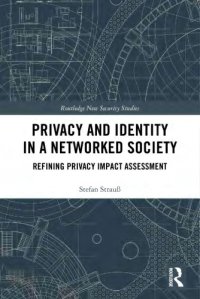
Ebook: Privacy and Identity in a Networked Society: Refining Privacy Impact Assessment
Author: Stefan Strauß
- Genre: Computers // Security
- Series: Routledge New Security Studies
- Year: 2019
- Publisher: Routledge
- Language: English
- pdf
This book offers an analysis of privacy impacts resulting from and reinforced by technology and discusses fundamental risks and challenges of protecting privacy in the digital age.
Privacy is among the most endangered "species" in our networked society: personal information is processed for various purposes beyond our control. Ultimately, this affects the natural interplay between privacy, personal identity and identification. This book investigates that interplay from a systemic, socio-technical perspective by combining research from the social and computer sciences. It sheds light on the basic functions of privacy, their relation to identity, and how they alter with digital identification practices. The analysis reveals a general privacy control dilemma of (digital) identification shaped by several interrelated socio-political, economic and technical factors. Uncontrolled increases in the identification modalities inherent to digital technology reinforce this dilemma and benefit surveillance practices, thereby complicating the detection of privacy risks and the creation of appropriate safeguards. Easing this problem requires a novel approach to privacy impact assessment (PIA), and this book proposes an alternative PIA framework which, at its core, comprises a basic typology of (personally and technically) identifiable information. This approach contributes to the theoretical and practical understanding of privacy impacts and thus, to the development of more effective protection standards.
This book will be of much interest to students and scholars of critical security studies, surveillance studies, computer and information science, science and technology studies, and politics.
Privacy is among the most endangered "species" in our networked society: personal information is processed for various purposes beyond our control. Ultimately, this affects the natural interplay between privacy, personal identity and identification. This book investigates that interplay from a systemic, socio-technical perspective by combining research from the social and computer sciences. It sheds light on the basic functions of privacy, their relation to identity, and how they alter with digital identification practices. The analysis reveals a general privacy control dilemma of (digital) identification shaped by several interrelated socio-political, economic and technical factors. Uncontrolled increases in the identification modalities inherent to digital technology reinforce this dilemma and benefit surveillance practices, thereby complicating the detection of privacy risks and the creation of appropriate safeguards. Easing this problem requires a novel approach to privacy impact assessment (PIA), and this book proposes an alternative PIA framework which, at its core, comprises a basic typology of (personally and technically) identifiable information. This approach contributes to the theoretical and practical understanding of privacy impacts and thus, to the development of more effective protection standards.
This book will be of much interest to students and scholars of critical security studies, surveillance studies, computer and information science, science and technology studies, and politics.
Download the book Privacy and Identity in a Networked Society: Refining Privacy Impact Assessment for free or read online
Continue reading on any device:

Last viewed books
Related books
{related-news}
Comments (0)